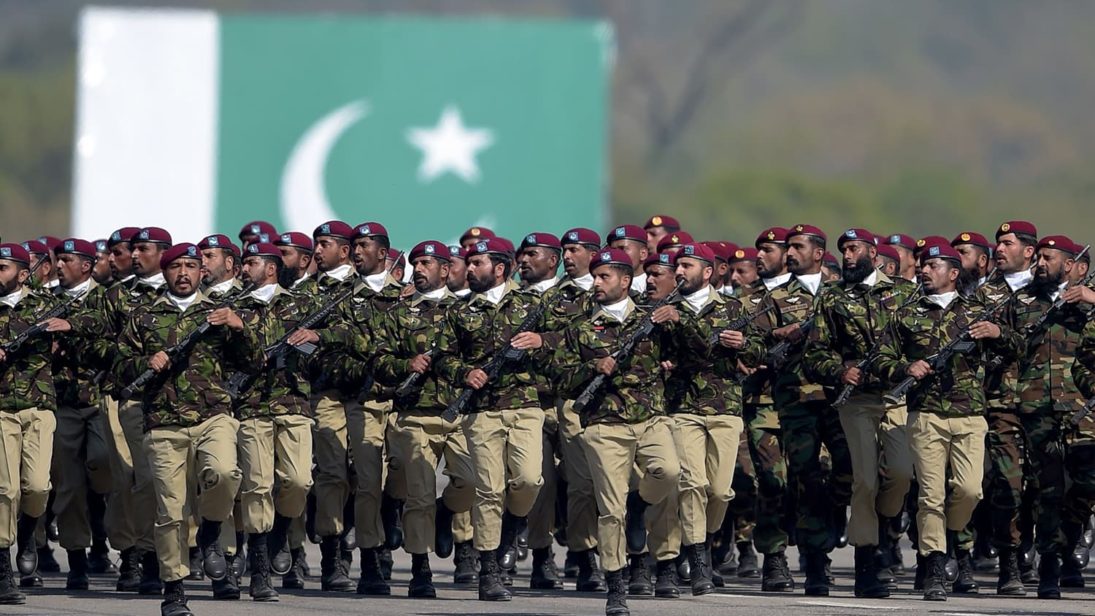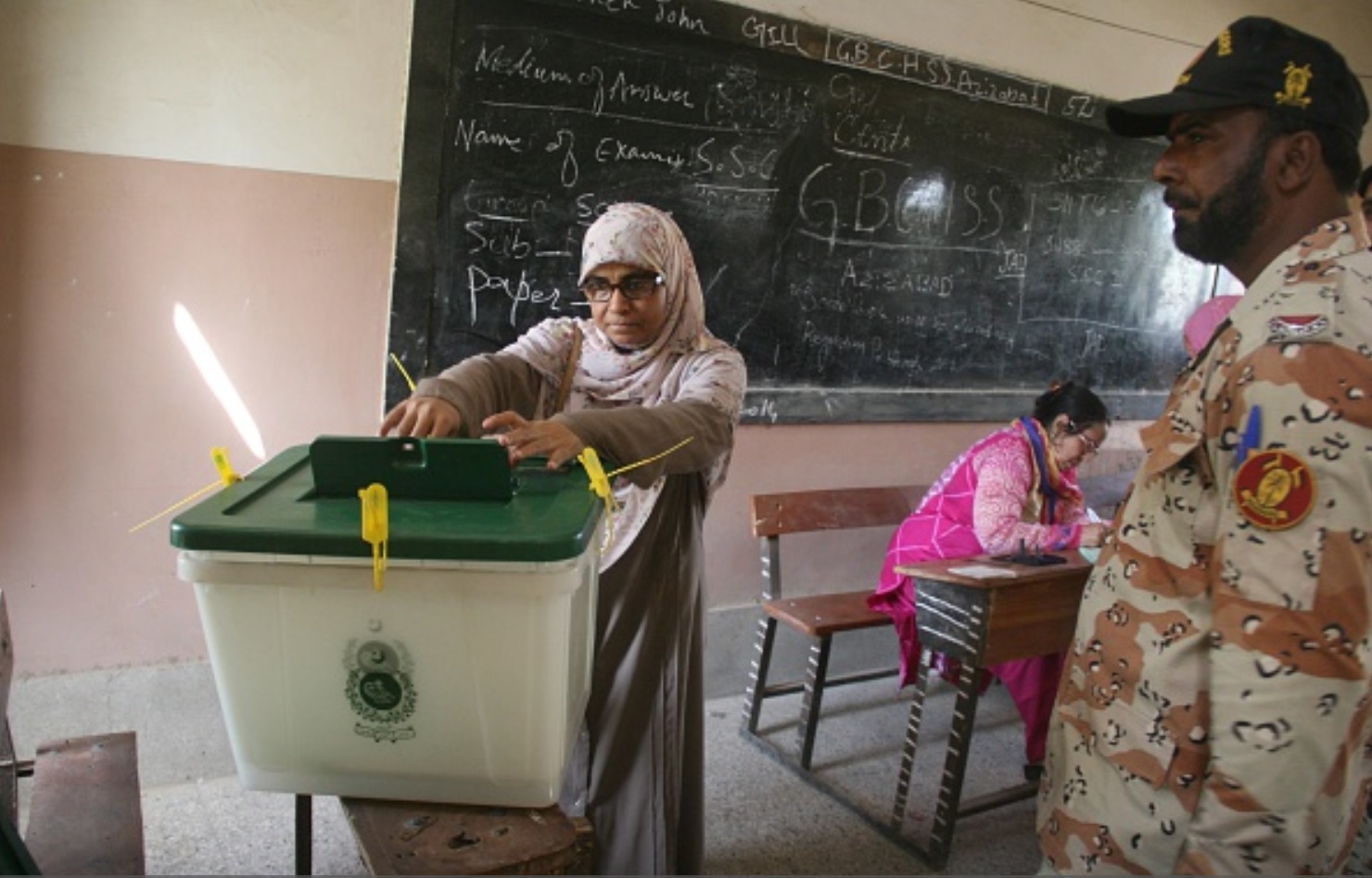
For democratic consolidation to take place, regular elections that enable successive transfers of power are necessary to arrest any backsliding towards authoritarianism. For the first time in its 71-year history, Pakistan can now boast of two successive democratic transfers of power, spanning the 2008-13 and 2013-18 parliamentary terms. This raises hope that democracy may now solidify in a country that has faced frequent periods of political turmoil and military rule. However, as Pakistan goes to the polls once again on July 25, a stark reality cannot be escaped. Although successive transfers of power look good on paper, they belie a trend that has been evident in Pakistani politics for decades: political parties may fight to gain potential voters but they simultaneously attempt to curry favor with the country’s premier institution, the military. When it comes to Pakistani politics, the military remains involved, whether covertly or overtly.
Civil-Military Dynamics
Since independence, Pakistan’s military has been its most stable institution, with unrivaled autonomy in decisionmaking and a strong public image. Following a string of short-lived crisis-prone civilian governments post-independence, the military emerged as a reliable institution with a reputation to manage complex situations and navigate major power interests, which sought to utilize Pakistan’s geostrategic location linking the Middle East with Central and South Asia. Military rule was first established in 1958 under General Ayub Khan, and as the military became more entrenched in domestic and international affairs, directly dealing with world powers on foreign policy issues, three more military governments would follow. While the military still maintains power behind-the-scenes, pressures from Western allies and domestic pro-democracy movements throughout Pakistan’s history have compelled it to avoid overt political roles in recent times.
Pakistan’s military does not take criticism of its conduct kindly nor does it appreciate challenges to its control of Pakistan’s national security. Thus, it may view the coming elections as an opportunity to further reassert its authority, as it has seemingly done in the past.
Pakistan’s last military ruler, General Pervez Musharraf, came to power in a 1999 coup, ousting then-Prime Minister Nawaz Sharif for a second time. Musharraf was forced to resign in 2008, effectively restarting Pakistan’s democratization process with fresh elections. The Pakistan People’s Party (PPP) formed a coalition government, but after a plethora of political crises and frequent civil-military tensions, it eventually lost to Sharif’s Pakistan Muslim League-Nawaz (PML-N) in 2013. Given his previous removal from office by the military, analysts believe Sharif’s attempt to take control of Pakistan’s security and foreign policies since returning to power further exacerbated his traditionally tumultuous relationship with the institution.
Pakistan’s military does not take criticism of its conduct kindly nor does it appreciate challenges to its control of Pakistan’s national security. Thus, it may view the coming elections as an opportunity to further reassert its authority, as it has seemingly done in the past. For a country aiming to showcase a working democracy, recent allegations against the military of undermining PML-N’s re-election chances and coercing certain media outlets and activists for having critical views hark back to reports of election manipulations under Musharraf in 2002, bringing the military-backed Pakistan Muslim League-Quaid (PML-Q) to power. While the military has officially distanced itself from the 2018 elections, it is likely to, at best, keep a watch over polling and, at worst, indirectly support more pliant candidates.

Current Political Landscape
At present, all major political parties are working hard to win at the polls: PML-N faces a tough fight to retain power to form government due to frequent defections, while the PPP’s support base has weakened, and the Pakistan Tehreek-i-Insaaf (PTI) continues to gain confidence.
Given the high stakes for key political players in Pakistan’s upcoming elections and the measures each side is willing to take to succeed, these elections are likely to be messy, either leading to a hung parliament or another crisis-prone coalition in power. Nonetheless, the military will remain a major player in Pakistan’s domestic and foreign policy maneuvering, regardless of who is in power.
After the Panama Papers scandal saw Sharif’s disqualification from office, PML-N members accused “non-democratic forces” (one of the many euphemisms used to avoid directly naming the military) of conspiring against Sharif. Shahid Khaqan Abbasi, Sharif’s replacement, was a more subdued premier for the remaining months as PML-N also failed to win a majority in the Senate. Even if PML-N manages to retain power in the upcoming elections, it will undoubtedly continue to face pressure from opposition parties, the public, and the military, weakening its chances of long-term survival. With PML-N on the defensive, the PPP will likely move to be part of any imminent coalition government, in order to retain its influence. Interestingly, under the Bhutto descendants’ leadership, the PPP has been more conciliatory towards the military, which perhaps provides an indication of the military’s role should the PPP be part of the incoming government. Meanwhile, PTI, a favorite among many urban classes that have been historically dismissive of politics, continues its crusade to bring change and transparency to Pakistan’s traditionally dynastic politics. However, PTI has sorely lacked the finesse and pragmatism required in the wheeling-dealing nature of Pakistani politics, and has only recently tried to woo in “electables” – both PML-N defectors and political freelancers often prized by parties during elections to win their local constituencies.
Under the leadership of cricketer-turned-philanthropist Imran Khan, the PTI has strong chances to win the upcoming elections and form the next government. Given that Khan has said that he is open to working with the military in Pakistan, a PTI win will likely be received positively by the security establishment, as it implies some sort of cooperation between the civilian government and the military in future policymaking. But even if the PTI wins, the inexperienced Khan may realize the troubles of premiership and institutional mismatch that can undo even the most hardened political brains in Pakistan. To this end, there is speculation on a potential coalition government taking power. However, coalitions are difficult to maintain, with diverging interests needing frequent compromise, and remain inherently vulnerable to internal fissures. With such complexities needing the attention of those in power, the future of democracy in Pakistan seems uncertain, at best.
The Road Ahead
Given the high stakes for key political players in Pakistan’s upcoming elections and the measures each side is willing to take to succeed, these elections are likely to be messy, either leading to a hung parliament or another crisis-prone coalition in power. Nonetheless, the military will remain a major player in Pakistan’s domestic and foreign policy maneuvering, regardless of who is in power—old habits die hard.
***
Image 1: Aamir Qureshi/AFP Photo via Flickr


